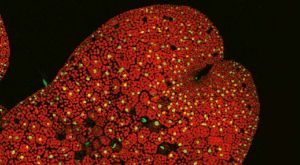An international study led by researchers at the Consejo Superior de Investigaciones Científicas (CSIC) has identified a new hormone that plays a key role in plant survival. The hormone, called dinor-OPDA, enables non-vascular plants (bryophytes) to defend themselves against outside stresses, including pathogens and insects. The study is featured on the cover of Nature Chemical Biology.
“In addition to identifying a plant hormone, we have clarified its biosynthetic pathway and have demonstrated the functional conservation of its signaling pathway (the molecular steps necessary for the hormone to activate the plant’s defenses),” explains Roberto Solano, CSIC researcher at the Centro Nacional de Biotecnología and principal investigator of the study.
The original idea behind the study was to identify how bryophytes (non-vascular plants) mount a defense against attacks from the outside. The defense mechanism in all other land plants (i.e. vascular plants) was previously known to be the jasmonates, which are essential phytohormones in plant survival due to their ability to enable plants to defend themselves from different types of stresses (e.g. pathogens, insects). “Some years ago, our research team discovered the active compound of this hormone, jasmonoyl-isoleucine, in the plant Arabidopsis thaliana,” notes Solano. However, this hormone, which has been found in many other vascular plants, does not exist in bryophytes (non-vascular plants), and as a result it was unknown how these plants defend themselves against external attack.
Using the liverwort Marchantia polymorpha, this newly published research has identified the hormone behind the bryophyte defense mechanism. “Liverworts are a type of bryophyte considered to be the sister lineage of all land plants, meaning they are the modern-day representatives of the first plants to colonize the earth," says Isabel Monte, the study’s first author. “By using this plant, we have demonstrated that the molecular signaling system of the hormone jasmonoyl-isoleucine is conserved in bryophytes, though the hormone that triggers this pathway is different from that found in vascular plants,” she adds. “What is most significant about this research is that we have identified this new hormone as two isometric forms of dinor-OPDA (dinor-cis-OPDA and dinor-iso-OPDA), which are to bryophytes what jasmonoyl-isoleucine is to vascular plants. Additionally, our work has pinpointed the hormone's biosynthetic and signaling pathway,” remarks Solano.
Solano also highlights some other noteworthy conclusions reached in the study: “As Marchantia polymorpha is considered to be the current representative of the first plants to populate the Earth, our findings suggest that the ‘ancestral’ hormone—that is, the hormone present in the lineage shared by all land plants—was dinor-OPDA, with jasmonoyl-isoleucine being a more recent development in vascular plants over the course of evolution. Further, though the hormone we have discovered is present in vascular plants, it was previously taken to be just a precursor of the hormone jasmonoyl-isoleucine. Our paper suggests that the new hormone may also have a hormonal function in vascular plants, which until now has been attributed to jasmonoyl-isoleucine. In our future work we hope to characterize this function.”
Soriano believes that this new research also confirms that studying such phylogenetically disparate organisms as Marchantia polymorpha can can lead to rapid advances in our understanding of the fundamental processes in all plant types.
- Fuente CSIC
- Isabel Monte, Sakiko Ishida, Angel M. Zamarreño, Mats Hamberg, José M. Franco Zorrilla, Gloria García-Casado, Caroline Gouhier-Darimont, Philippe Reymond, Kosaku Takahashi, José M. García-Mina, Ryuichi Nishihama, Takayuki Kohchi and Roberto Solano. Ligand-receptor co-evolution shaped the jasmonate pathway in land plants. Nature Chemical Biology. DOI: 10.1038/s41589-018-0033-4






